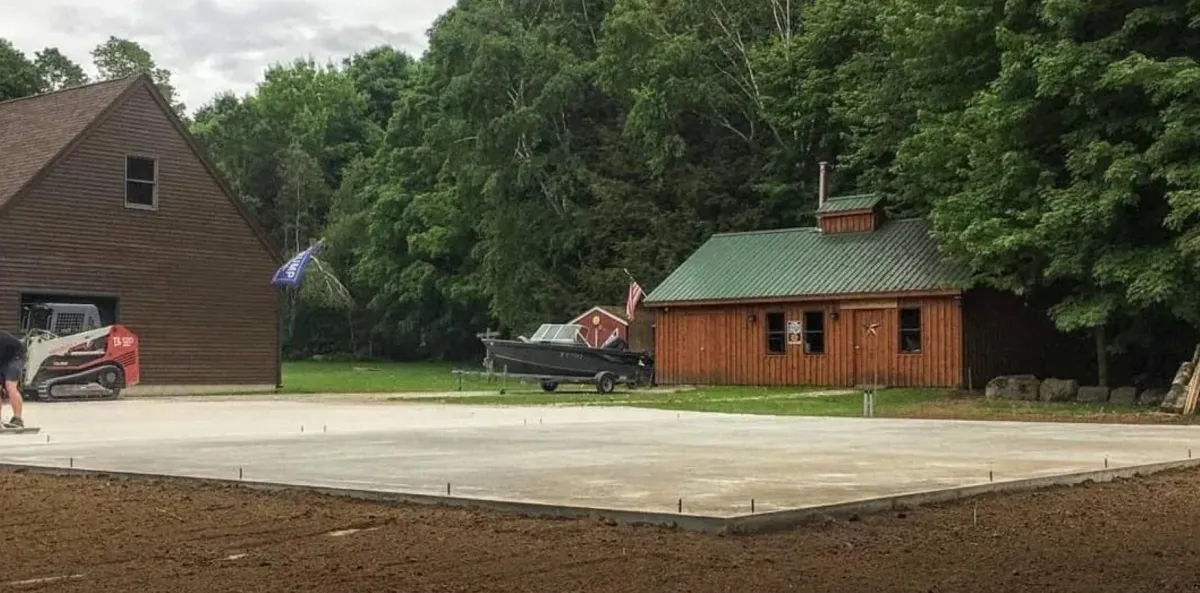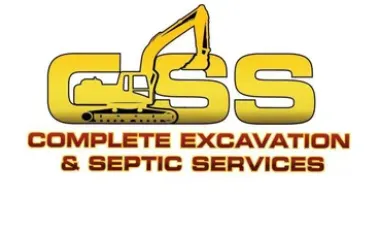
Proudly Serving: Grand Isle, Franklin & Chittenden Counties, VT and Clinton County, NY

Top Homeowner Complaints About Concrete Flatwork Cracks Near Burlington, Chittenden County, and How to Avoid Them
Why Do So Many Homeowners near Burlington Have Issues with Cracked Concrete?
You saved up. You researched. You hired a contractor who promised a smooth, durable concrete driveway, patio, or walkway. And now? Cracks. Not tiny hairline ones that you can ignore, but real, noticeable cracks creeping across your once-pristine flatwork. Frustrating? Absolutely.
Homeowners throughout Burlington and Chittenden County are all too familiar with the heartbreak of cracked concrete. The worst part? Many of these cracks happen sooner than expected. If this has happened to you, you’re probably wondering: Did I do something wrong? Was the concrete bad? Did my contractor cut corners?
At Complete Excavation & Septic, we hear these frustrations all the time. And we get it. No one wants to shell out thousands of dollars only to watch their investment fall apart. That’s why we’re here to walk you through the most common homeowner complaints about concrete flatwork cracks, why they happen, and—most importantly—how to prevent them in the future.
The Most Common Complaints About Concrete Flatwork Cracks
“I Paid Good Money—Why Is My Concrete Already Cracking?”
You’re not alone. Many homeowners invest in concrete flatwork expecting it to last decades, only to see cracks form within the first year. This usually happens due to improper installation, poor curing, or a weak mix. More on that in a minute.
“The Cracks Keep Getting Worse—Is My Concrete Failing?”
Some cracks start small but widen over time. This can be due to Vermont’s freeze-thaw cycles, shifting soil, or even poor joint placement. If left untreated, these cracks can lead to full-on breakage.
“My Driveway Looks Terrible—Can This Even Be Fixed?”
A few cracks might be an eyesore, but widespread cracking can make a driveway or patio look neglected. The good news? Some cracks can be repaired, but severe cases may require replacement.
“I Thought Concrete Was Supposed to Last a Lifetime!”
Concrete is durable, but it’s not indestructible. Without the right preparation, materials, and maintenance, even the best-looking slab can fail long before it should.
What Causes Concrete Flatwork Cracks in Vermont’s Climate?
The Freeze-Thaw Cycle: Why Winter Wreaks Havoc
Vermont’s winters are brutal on concrete. Water seeps into small pores and cracks, then freezes and expands. This constant expansion and contraction weakens the structure, causing cracks to form and grow over time.
Poor Installation Practices That Lead to Premature Cracking
Not all concrete jobs are created equal. If your contractor rushed the job, skipped reinforcement, or didn’t properly control curing conditions, you might end up with cracks much sooner than expected.
Concrete Mix Mistakes: Strength Matters
The wrong mix can mean the difference between a driveway that lasts 30 years and one that fails in 5. A weak mix, too much water, or the wrong additives can all lead to premature cracking.
Shrinkage Cracks vs. Structural Cracks—What’s the Difference?
Shrinkage cracks occur as concrete dries and shrinks. They’re often small and not a big concern. Structural cracks, however, are a sign of deeper issues—like poor soil preparation or lack of reinforcement.
How to Prevent Concrete Cracks Before They Start
Choosing the Right Contractor (Yes, It Matters!)
A skilled contractor knows how to properly mix, pour, and finish concrete to maximize its longevity. Look for professionals who understand Vermont’s climate challenges and have a track record of quality work.
Reinforcement and Control Joints: The Key to Durability
Steel reinforcement (like rebar or wire mesh) strengthens concrete, while control joints help direct cracking along designated lines instead of randomly across the surface.
Proper Curing: Why Rushing the Process Leads to Cracks
Curing is crucial. If concrete dries too fast, it becomes brittle and prone to cracking. Keeping it damp for the first few days ensures maximum strength and durability.
Drainage and Site Prep: The Foundation for Long-Lasting Concrete
Water pooling underneath concrete weakens the base and leads to shifting and cracking. Proper grading and drainage solutions prevent this issue before it starts.
What to Do If Your Concrete Flatwork Is Already Cracking
When to Repair vs. When to Replace
Not all cracks mean your concrete is a lost cause. Small, superficial cracks can often be sealed, while deeper cracks might require professional patching. Widespread damage? That’s when replacement may be necessary.
DIY Fixes vs. Professional Solutions
Hardware stores sell DIY crack fillers, but these are usually temporary fixes. If you want a long-lasting solution, a professional repair using high-quality materials and proper techniques is the way to go.
The Role of Sealants and Resurfacing in Extending Lifespan
Applying a sealant can help protect against future damage, while resurfacing can give old, cracked concrete a fresh new look—without the cost of full replacement.
Getting the Best Concrete Flatwork in Chittenden County
Cracked concrete is frustrating, but it doesn’t have to be inevitable. Understanding what causes cracks—and how to prevent them—can save you money, stress, and disappointment in the long run.
At Complete Excavation & Septic, we know what it takes to install durable, long-lasting concrete flatwork in Vermont’s tough climate. We take site prep seriously, use high-quality materials, and ensure every job is built to withstand the test of time. If you’re tired of dealing with cracked concrete and want a solution that actually lasts, we’re here to help.
Want to learn more or get a quote? Let’s talk.

Hours:
Mon - Fri 9:00 am - 5:00 pm
Extended hours by appointment only.



All rights reserved | Privacy policy | Client Support Area
Disclaimer: Septic inspection credit is applied to septic installations only and must be redeemed within 7 days after a written quote provided upon state acceptance of design.
Disclaimer: Septic soil test credit is applied to septic installations only and must be redeemed within 7 days after a written quote provided upon state acceptance of design.
